Best Flash Drives: Fast, Roomy USB Storage in Your Pocket - Tom's Hardware
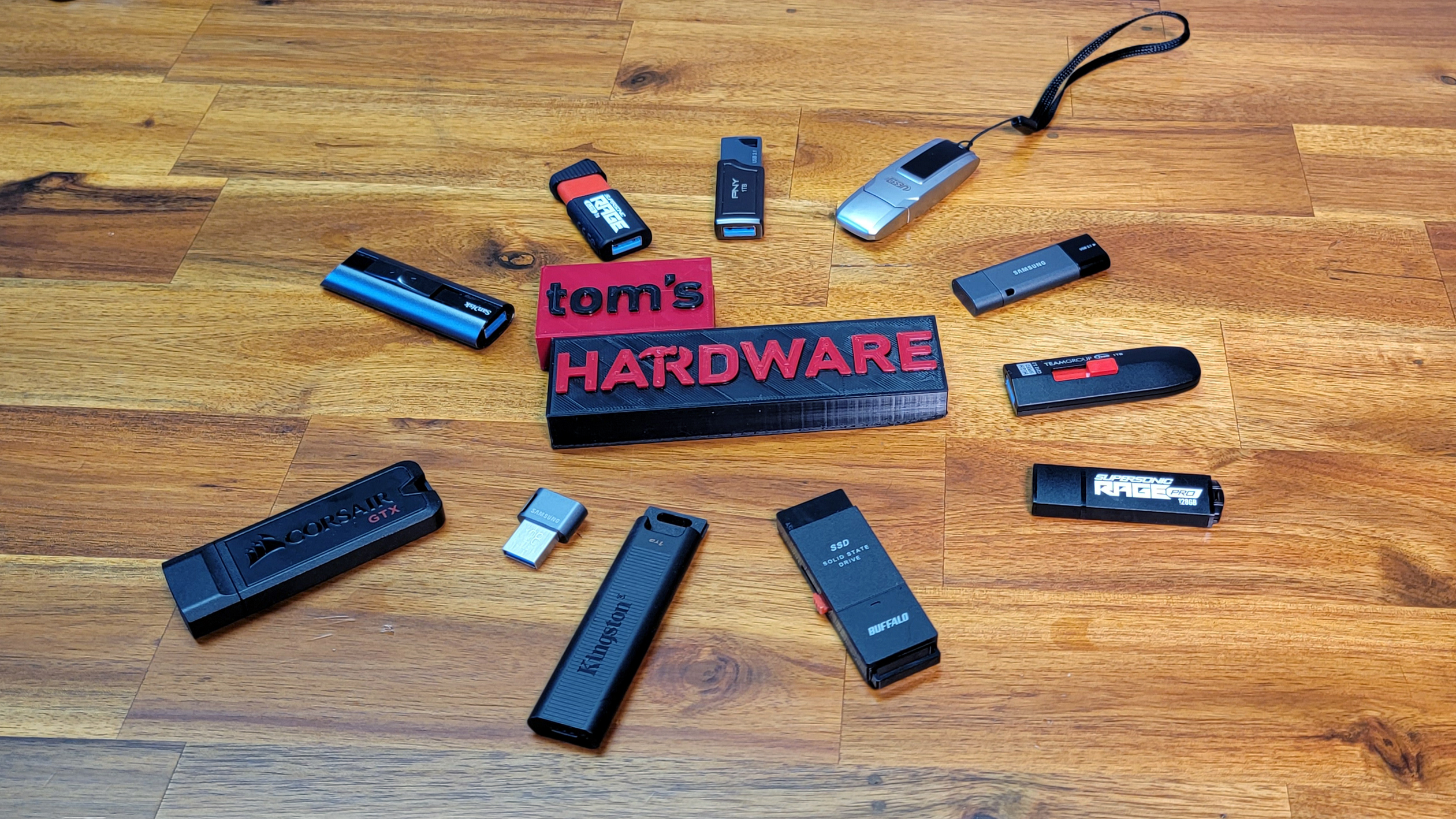
USB flash drives have been ubiquitous for decades, remaining the go-to option for anyone who needs local, pocketable access to key files. Flash drives are still sold everywhere (including chain drug stores, usually at highly inflated prices), despite companies like DropBox, Google, and Microsoft making cloud storage a convenient and often free alternative (depending on capacity).
For many, a flash drive that you can carry around in your pocket or on your keychain is still a better option – and faster if you don't have a speedy internet connection on every device you use. You may also need a USB flash drive to do a clean and speedy install of your favorite OS (see how to do a clean install of Windows).
Also, a good flash drive can be surprisingly tough to destroy. I've sent flash drives through laundry cycles in pants pockets in the past, and once when I was in college, I accidently drove over my flash drive with my car, crushing its outer shell. But in all cases, my data remained intact.
Because these drives seemingly last forever, you could be hanging onto one that's pitifully slow by today's standards, and too cramped to hold all the data you want. Capacities of up to 2TB are an option with some models (and 1TB is becoming common), and performance on the best flash drives approaches that of some of the best external SSDs.
If you've been hanging onto a drive for several years, now's a good time to upgrade. To help you choose what drive is best for you, we've tested dozens of recent flash drives from leading brands and listed the best USB flash drives below. However, if fast performance is important to you and you can live with a device that's just a little bit bigger, an external SSD might be a better buy. And while the prices of M.2 SSDs remain low, you may find more value by building your own external SSD.
Best Flash Drives You Can Buy Today
Why you can trust Tom's Hardware Our expert reviewers spend hours testing and comparing products and services so you can choose the best for you. Find out more about how we test.
Best Flash Drive Overall
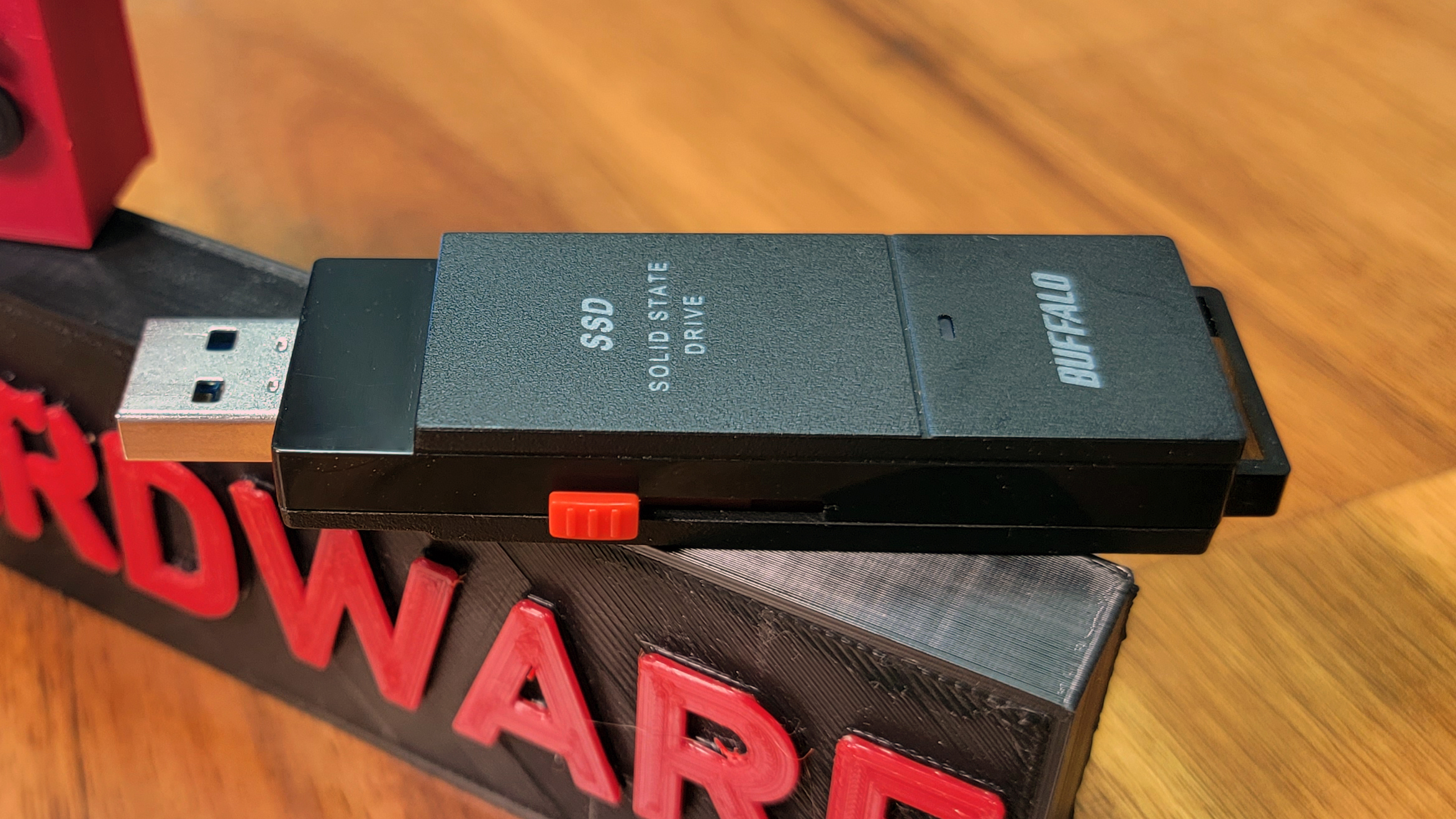
This drive from networking and storage stalwarts at Buffalo stands out for being a good balance between fast performance and affordable pricing. It usually costs about $20-$30 less than the faster Kingston DataTraveler Max, while still delivering 616.9 MB/s sequential read speed and 543.9 MB/s sequential writes in our CrystalDiskMark tests. It's a bit bulky at about 3/4 of an inch wide at the port, and 0.9 inches wide at its maximum width. It uses a USB Type-A port, although a USB-C adapter is included in the box.
Selling for around $70 for the 1TB model when we wrote this, it's more affordable than many 1TB alternatives, and it's even available in a 2TB model, which usually sells for less than $150. I just wish the drive's plastic shell felt less creaky and cheap, although that's an issue with the pricier Kingston DataTraveler Max, as well. There's a slot at the back of Buffalo's drive for attaching it to a lanyard, but this drive doesn't feel like it would last that long getting jostled around everywhere alongside your keys.
Best Fast, Affordable Flash Drive
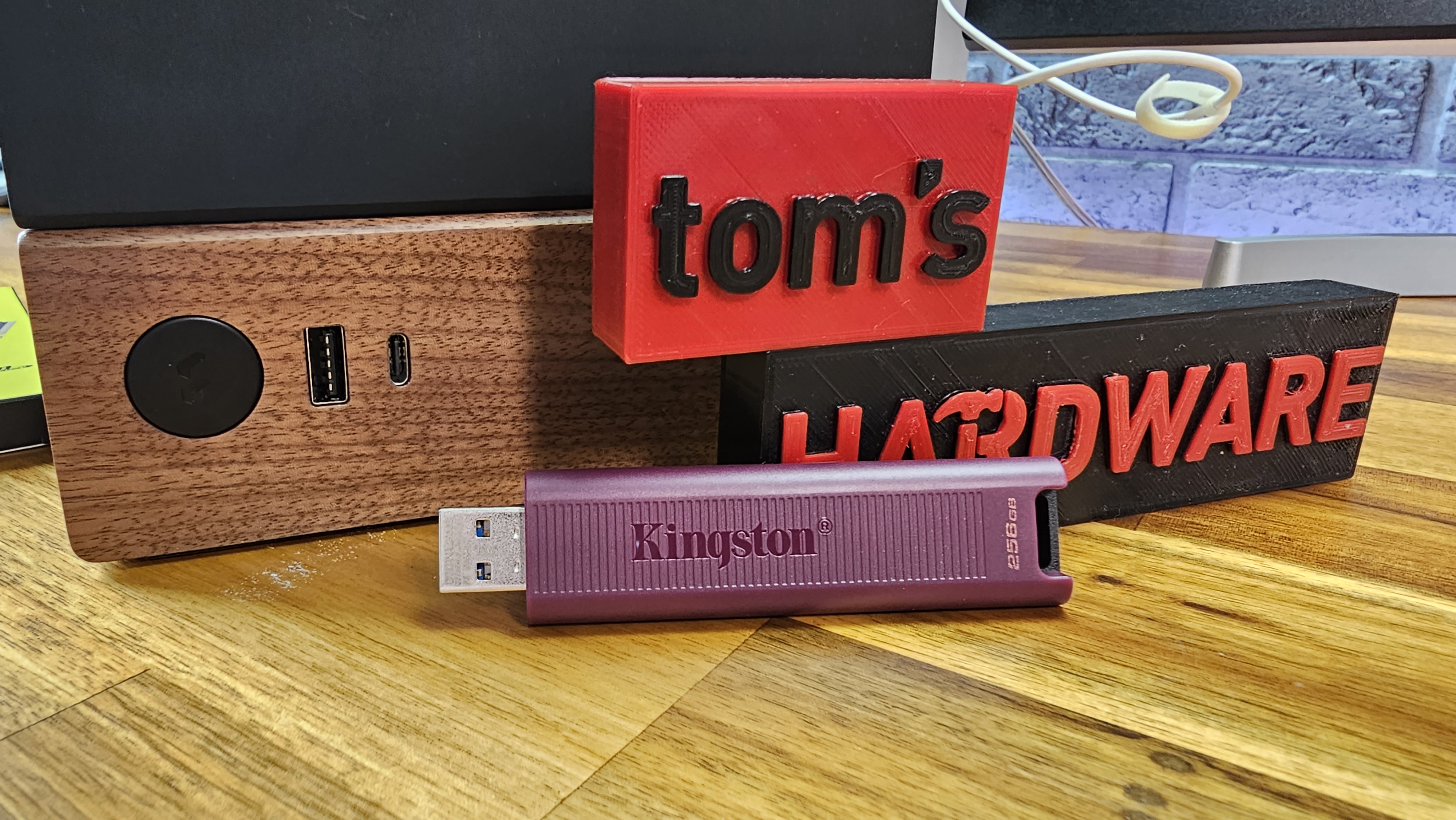
Just like its roomier 1TB variant, the 256GB Kingston DataTraveler Max is a speed demon in the flash drive world, even if it falls a bit short of the newer Transcend ESD31C Portable SSD (see our next pic, below). But at $30-$35, Kingston's 256GB drive is a great balance of speed, affordability and capacity for those who don't want to spend much more on a roomier fast alternative.
Available with either a USB-C or USB-A connector (though not both, like Transcend's drive), the 256GB DataTraveler Max performed nearly as well as its more spacious 1TB sibling in our PCMark, DisBench, and CrystalDiskMark tests, making it the second-fastest flash drive we've tested (third if you count the 1TB Kingston drive as competition). And it's also fairly slim, making it easy to slip into a pocket.
Just note that, if you're a desktop user and you opt for the model with the USB-C port, you will likely have problems plugging the drive into rear USB-C ports on the motherboard. Thanks to the two-piece plastic slide mechanism that protects the drive's port when not in use, the USB-C connector is just a bit too short to plug into most motherboards successfully. I tried this with three boards I have on hand and had the same issue with each. But, if your PC case has a front USB-C port or you're using a laptop, this shouldn't be an issue. I only had a problem with rear motherboard ports and this drive.
Fastest Flash Drive
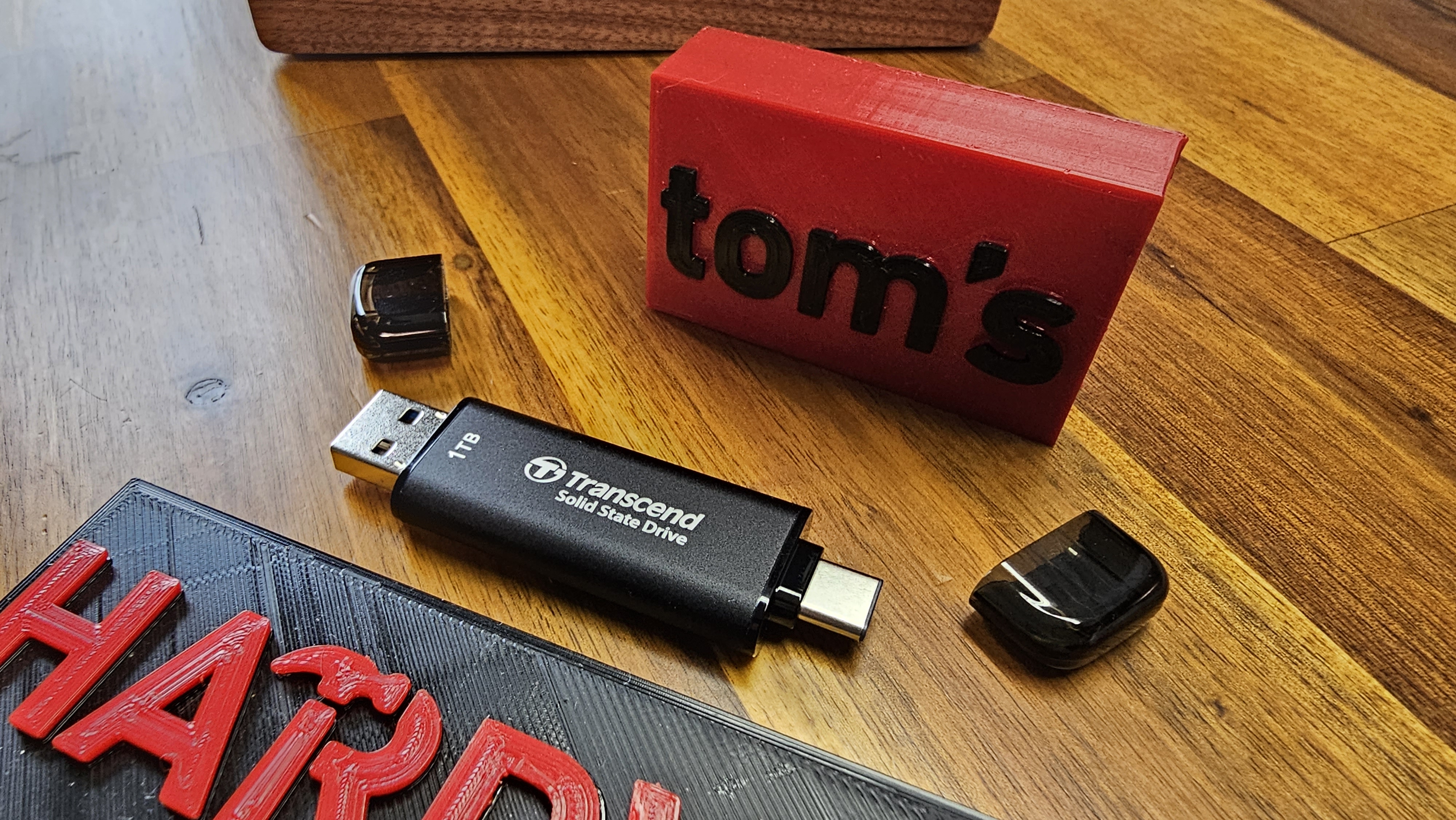
If you feel the need for flash drive speed, Transcend's forgettably named ESD31C Portable SSD is the fastest drive in a true flash drive form factor, although Kingston's DataTraveler Max wasn't far behind on most of our tests, and was often a bit speedier when it comes to writes.
Still, with the fastest scores we've seen yet for one of these drives in PCMark, DiskBench, and CrystalDiskmar's sequential tests (see charts, below), The Transcend drive isn't hard to recommend. Aside from its top-notch performance, it also sports both a UCB-C and a USB-A port (one on each side) and a metal shell that feels a lot nicer than much of its plastic-clad competition. And selling for about $88 when we wrote this (in the 1TB variant we tested), it's also cheaper than the Kingston drive, which often sells for closer to $100. And the Transcend drive is available in a 2TB model, while Kingston's drive tops out at 1TB.
That doesn't mean that Transcend's ESD31C Portable SSD doesn't have its drawbacks. For starters, it was the warmest drive we tested under sustained use. After just a few minutes of heavy writes, it hit 93.7 degrees Fahrenheit. That's not exactly going to burn you, but if using it as an external drive to run programs from, it may get even hotter. This is a downside, in part, to having a slim (0.31-inch) frame rather than the bulkier plastic used by competing drives.
The translucent port caps on either end of the ESD31C Portable SSD also don't fit very snugly, which makes them easy to lose. But if speed is a key need for your portable, pocketable storage needs (and you don't want a larger, more traditional portable SSD), the ESD31C is the best, fastest option we've tested yet.
Best Cheap and Tiny Flash Drive
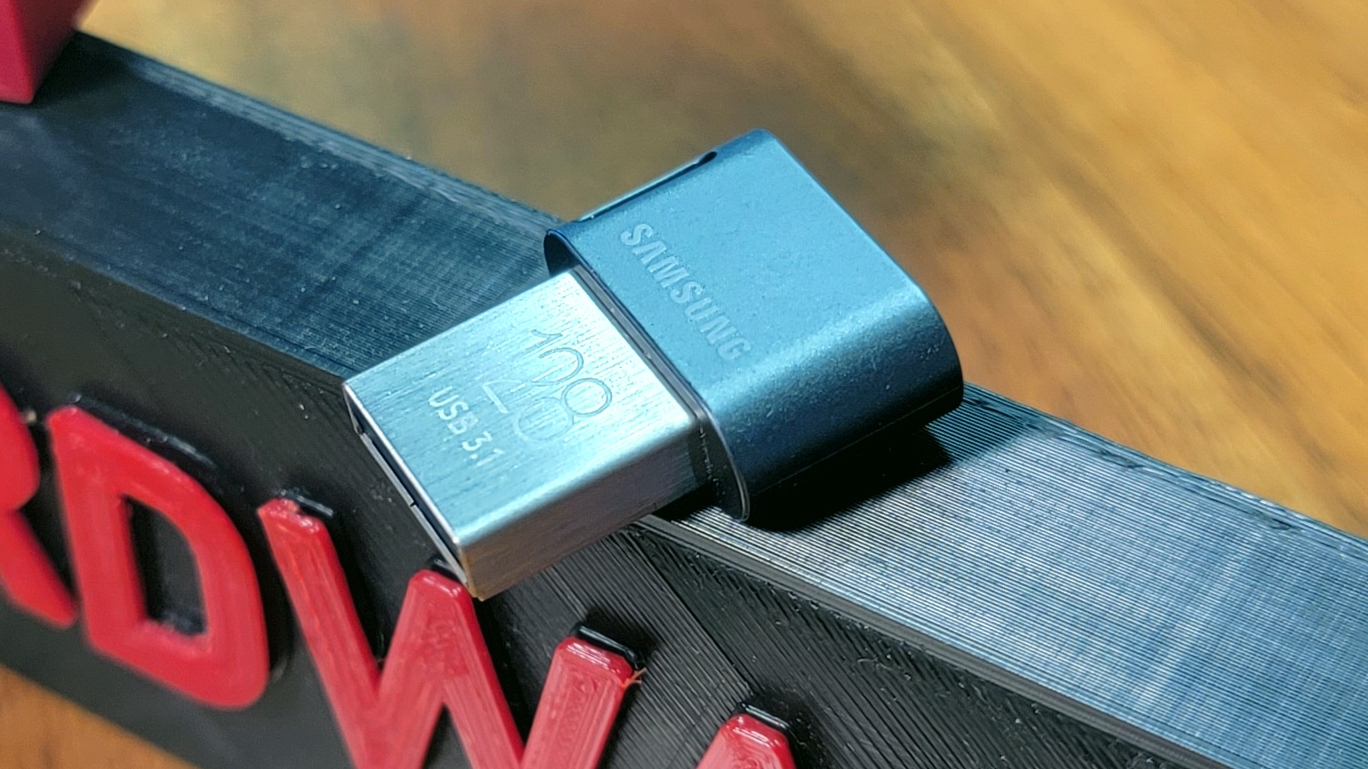
If you're after a drive that's small enough to leave plugged into your laptop most of the time, or you just want something you can clip to your keychain and forget about until you need it, Samsung's FIT Plus stands out. The 128GB model we tested sells for $18, and when we wrote this the top-capacity 256GB model was selling for just $25 direct from Samsung. At less than an inch long including its USB-A connector, it will stick out of your port less than an inch when plugged in. And it has a hole for a lanyard, it feels solid – in fact, this sub-$20 drive feels better than the most expensive drives on our list. And Samsung says it's rated to survive in up to 1 meter of water for 72 hours. In case it doesn't, the company covers the drive with a generous five-year warranty.
That being said, our testing shows this tiny drive is in a much lower performance class than the bigger, pricier, roomier models. On our real-world DiskBench 10GB test, the Samsung Fit Plus read our files at a decent 319.7 MB/s, but could only write at 58.4 MB/s. That's just over half the read speed and less than 15% of the write speed of Kingston's 1TB DataTraveler Max. That said, the Samsung drive's performance was still significantly better than most of the drives we tested with capacities less than 1TB. SanDisk's Extreme Pro 128GB wrote our test files about twice as fast, but it costs nearly 2.5 times as much and is more than six times longer.
Best High Capacity Flash Drive
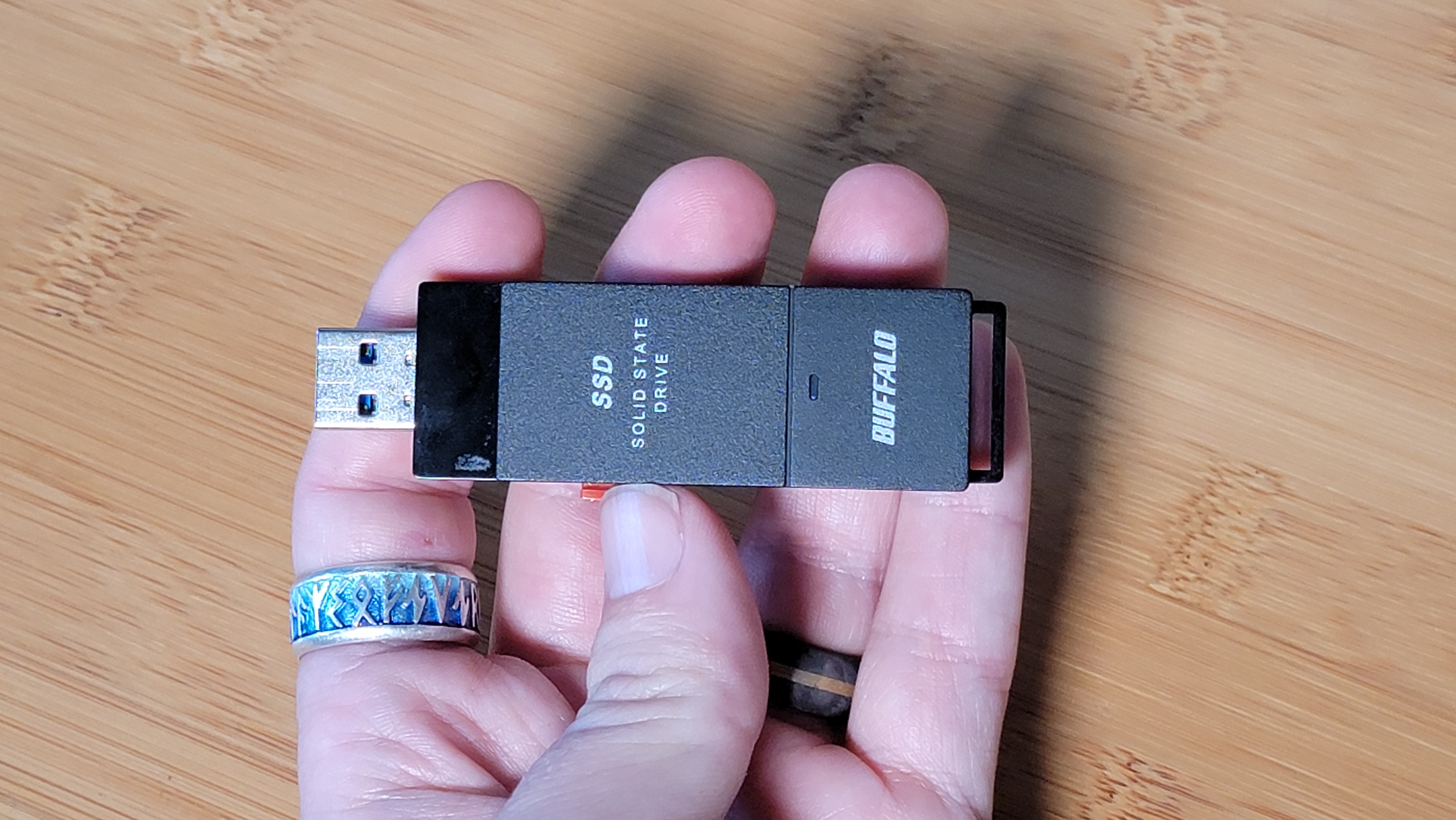
There are loads of insanely cheap no-name 2TB flash drives available on Amazon and sites like Aliexpress if you like throwing your money at scammy garbage tech – but the 2TB Buffalo SSD-PUT is real and (at $160 when we wrote this) a surprisingly good deal. It's cheaper than most larger 2TB external SSDs (although some of those will definitely be faster), and significantly smaller (although still bulky for a flash drive). Overall, this drive did slightly better on our benchmarks than its 1TB sibling, meaning it doesn't beat or often quite match the Kingston DataTraveler Max. But for the price -- and especially considering it's one of a very few 2TB drives available from a known brand, this is a very impressive performer.
On the minus side, the drive has the same creaky, cheap-feeling plastic shell as the 1TB model, and it's nearly an inch wide, making it a tight fit on some laptops where the ports are placed close together. But you get a roomy 2TB of pocket-friendly storage at fast speeds (for a flash drive), and a bundled USB-C adapter should your device not have a USB-A port handy. If Buffalo would just release this drive in solid-feeling metal housing (or even a solid-feeling plastic one), this would arguably be the perfect flash drive for those who need lots of storage in their pocket.
Flash Drive Shopping Considerations
One thing to keep in mind when shopping is what type of ports you'll be plugging your flash drive into. Some drives are offered with either a USB-A connector or USB-C, and some come with adapters to convert from USB-A to USB-C or vice versa. A few drives have both connectors on the same drive, which is certainly more convenient than having to keep track of an adapter and have it with you every time you need it. All of the faster flash drives we've tested have a single Type-A or Type-C connector. Also, note that drives that promise speeds of 500 MB/s or more use USB 3.x Gen 2 (10 Gbps) ports. That means if you're plugging those drives into a USB 3.0/USB 3.1 Gen1 (5Gbps) port (those are still far more common than the faster Gen 2 ports), performance won't be as fast as it could be.
Still, the performance differences between the lower-cost, lower-performing drives in our testing below and the higher-performing 1TB drives that top our test results are at times nearly a factor of 10, especially when it comes to write speeds. So even when you plug one of the fastest drives into a slower 5Gbps port, you should get much better performance than you would if using an older or cheap sub-$20 flash drive.
How We Test Flash Drives
How We Test Flash Drives
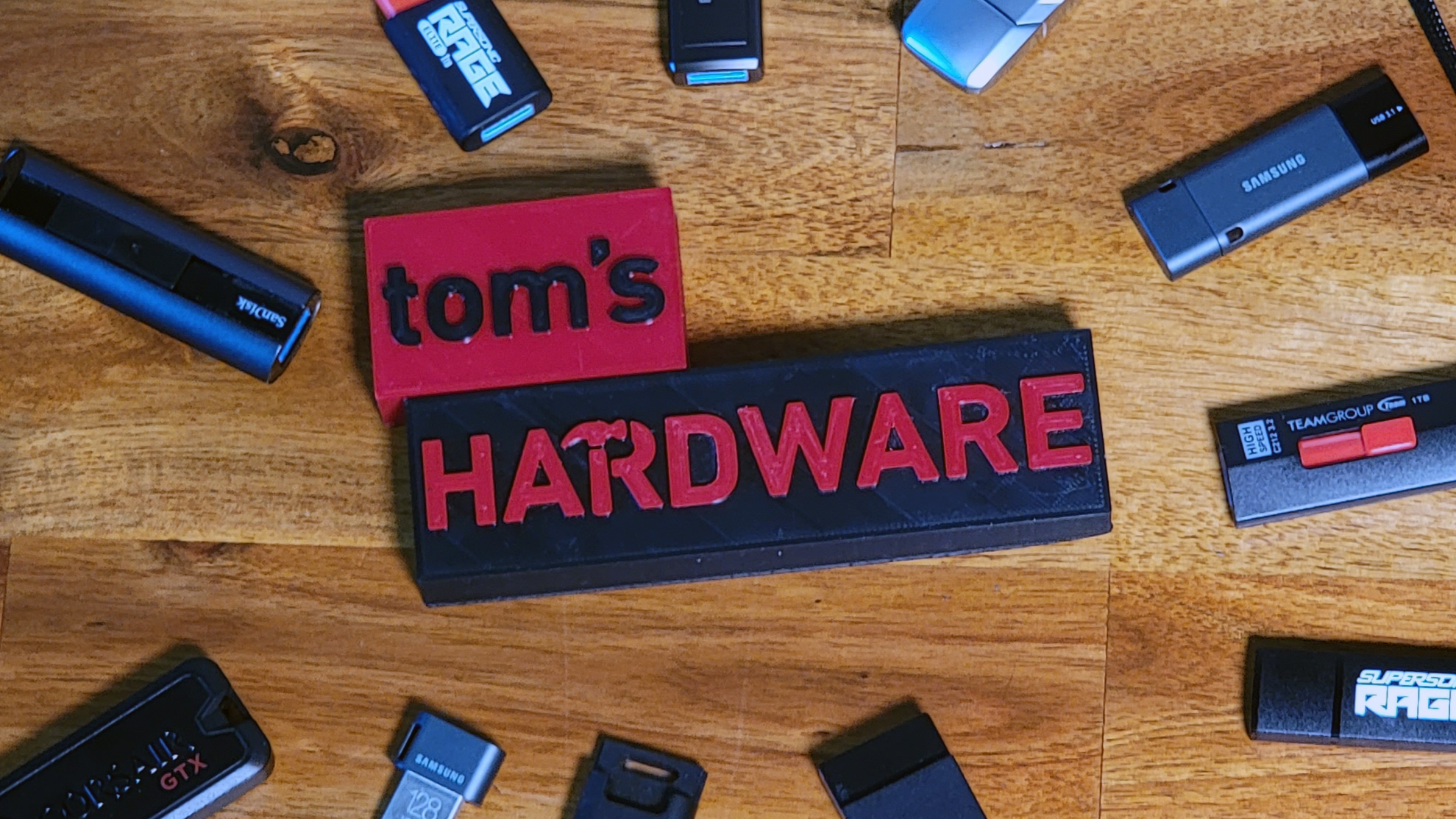
We ran our benchmark tests on a custom desktop running Windows 10 Pro on an AMD Ryzen 7 3700X CPU and a Gigabyte X570 Aorus Master motherboard with 16GB of RAM and an older (but still speedy) Samsung 960 Pro boot drive. We also spot-checked our first few drives on a newer system using a Ryzen 5 5600X CPU and a much faster PCIe 4.0 Corsair MP600 Pro XT boot drive. But because none of these drives even get close to the bandwidth limitation of PCIe 3.0, there was no discernable performance differences between the two test systems.
All of our benchmark testing was done with drives plugged into the system's rear USB 3.1 Gen 2/ USB 3.2 (10 Gbps) ports. The Aorus board we used has one Type-C and one Type-A port rated for these speeds, so we were able to accommodate drives with both types of connectors.
To get a sense of how these flash drives compare to a larger (though still usually pocketable) external SSD, we also ran our flash drive tests on the Mushkin's CarbonX, a 1TB External SSD that's rated to similar speeds as the fastest flash drives, or "Up to 1,000 MBps." This drive is no longer widely available, but you can expect similar performance from some of the more affordable options on our Best External SSDs list.
Given the falling prices of external SSDs and their general ability to perform better on longer-duration workloads (and particularly small file writes, which we'll see shortly in testing) an external SSD is often a better option if you are going to frequently be moving large amounts of files on and off your drive, and especially if you plan to run programs from your portable storage device. The larger surface area and improved controllers and components of external SSDs tend to be better at those kinds of tasks, though there are of course noticeable performance differences in that product category as well.
Trace Testing – PCMark 10 Storage: Data Drive Benchmark
PCMark 10 is a trace-based benchmark that uses a wide-ranging set of real-world traces from popular applications and common tasks to measure the performance of storage devices. To test drives that store files rather than applications (in most cases you shouldn't be running programs off a flash drive), we utilize the Data Drive Benchmark in UL's PCMark 10.
Comments
Post a Comment